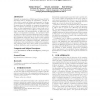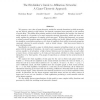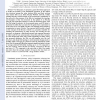18 search results - page 2 / 4 » Formation of cooperation structure by interaction network in... |
ATAL
2007
Springer
13 years 11 months ago
2007
Springer
Research on organization of Multi-Agent Systems (M.A.S.) has shown that by adapting its organization, a M.A.S. is better able to operate in dynamic environments. In this paper we ...
KI
1998
Springer
13 years 9 months ago
1998
Springer
Abstract. In Distributed Problem-solving (DPS) systems a group of purposefully designed computational agents interact and co-ordinate their activities so as to jointly achieve a gl...
CORR
2010
Springer
13 years 5 months ago
2010
Springer
We propose a new class of game-theoretic models for network formation in which strategies are not directly related to edge choices, but instead correspond more generally to the ex...
FLAIRS
2006
13 years 6 months ago
2006
The process of coalition formation, where distinct autonomous agents come together to act as a coherent group is an important form of interaction in multiagent systems. Previous w...
ICC
2009
IEEE
14 years 20 hour ago
2009
IEEE
— In this paper, we propose a game theoretical approach to tackle the problem of the distributed formation of the uplink tree structure among the relay stations (RSs) and their s...



